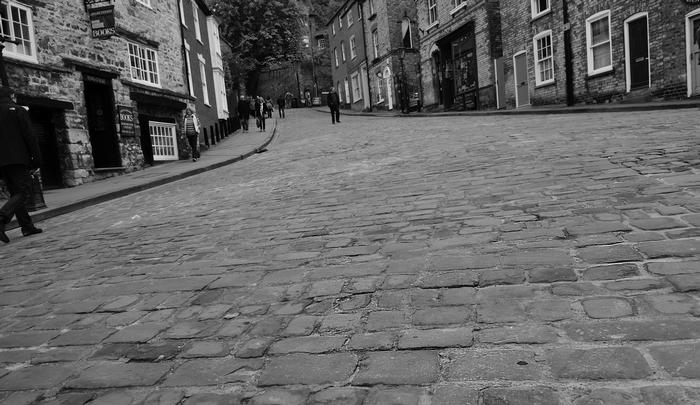Sophia Bannert - ProposalA day in the life of a wheelchair user: navigating LincolnAlone and small in the street, my self-awareness heightens. Large swarms of hurried people part when they see me approaching. My whole identity has changed in the eyes of the city, within minutes. My wheelchair is my fortress and the enemy. With its large spindly wheels as my first and only defence, they are also my burden. Jarred into an utterly complex version of what I formerly knew as reality, my eyes begin scrutinising and dissecting the cobbled street surface ahead into zones which I can, and cannot access. Never before had I seen the streetscape in such meticulous detail. Tiny height differences, such as curbs and grooves between cobbles, become mountains, cruelly halting progress and making small advances, exhausting. In the words of Raymond Lifchez, ‘Architecture can be empowering, only if architects develop empathy.’ This quote rang true in my mind after being denied the use of the disabled toilet in the University of Lincoln’s Architecture building. It was too slim to manoeuvre my wheelchair inside and close the door. The architecture of the city denies access to the less able, indicating an impoverished ability to empathise with the largest minority group in the world: people with disabilities. In the town there is, however, a 16 metre metal sculpture named Empowerment, designed by artist Stephen Broadbent, costing the city money which, in my opinion, could have been used to better empower people. I make my way to a ramp situated at the back entrance of a supermarket, to buy lunch. After several attempts with different approaches; I still can’t heave myself up the ramp. The incline is too steep; with a final attempt my wheelchair falls behind me and I am hurled out of the chair onto the cold, mocking, concrete. This is a statement to all designers and architects. Within a mere few hours of navigating Lincoln in a wheelchair, my basic human rights have been breached more than once. One of the most historic cathedral cities of Europe, Lincoln is situated in the East Midlands of England. People are attracted to the city’s historical cobbled streets, which weave the city body together like capillaries, constricting the flow of people in places and allowing access via tangles of ‘short cuts’, in others. Lincoln is divided across the foot and head of a hill. Built by the Romans to connect these two districts is ‘Steep hill’. Named ‘Britain’s best place’ in 2011 by the Academy of Urbanism, Steep Hill is notorious for its difficulty in ascending and descending. The installation of a funicular railway has been discussed to improve accessibility, but is as yet just an idea. Spending one day in a wheelchair provided insight into the complex relationship between people and place. I aim to amplify the perspective of the disabled. I endeavour to propose how this city can facilitate easy access, and therefore equality and dignity to all, regardless of ability. Lincoln’s beauty and history should be there for all to enjoy and appreciate. Everybody deserves equal access. Additional Help and InformationAre you in need of assistance? Please email info@berkeleyprize.org. |
|

